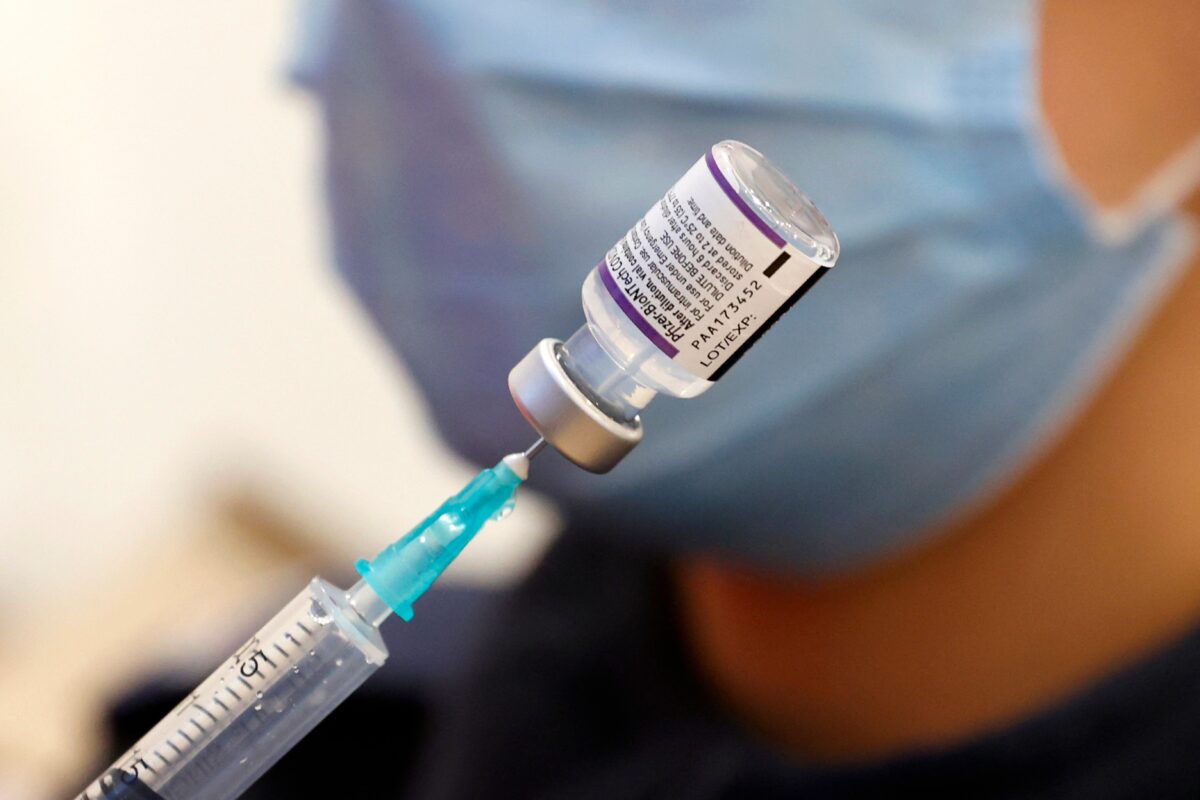Protection From Second Booster Quickly Wanes: Israeli Study
The boosted protection from a second booster shot of Pfizer’s COVID-19 vaccine against virus infection quickly waned, a new study found. People with three doses have seen their protection against infection drop considerably following the emergence of the Omicron variant of SARS-CoV-2, also known as the CCP (Chinese Communist Party) virus. That prompted Israeli regulators to clear a fourth dose, or second booster, of Pfizer’s jab in January. While protection against infection did shoot up initially after the fourth dose, hitting 64 percent during the third week, it rapidly declined thereafter and hit 29 percent by 10 weeks post-administration, Israeli researchers found. “It appears that effectiveness of the fourth dose wanes sooner, similarly to the fact that the third dose wants sooner than the second dose,” they wrote in the paper, which was published as a preprint. Pfizer and its partner, BioNTech, on March 15 asked U.S. regulators to authorize second boosters for all elderly people. The request was based on Israeli data that the companies said shows the additional shot lowers rates of infections. The new study saw researchers with Maccabi Healthcare Services and Yale School of Public Health analyze data from the services’ database, which covers approximately 2.5 million people, or over a quarter of the population in Israel. All people in the database aged 60 or older were included in the analysis, exempting individuals who tested positive for COVID-19 before the start of the study period, or Jan. 10, and those who joined the database after March 2020. Researchers counted who people tested positive for COVID-19 seven or more days after inoculation with the vaccine as well as people whose infections despite being vaccinated resulted in hospitalization or death. Researchers found poor protection against infection. They also discovered the protection against severe disease did not wane considerably, but that protection from the third dose against hospitalization was already high. Limitations of the paper, which was funded by Maccabi, include researchers only looking at 10 weeks of data. A separate Israeli study, published earlier in March, found even worse results among young healthcare workers. Approximately 274 workers received a fourth dose. Among those who received Pfizer’s shot, vaccine protection against infection was 30 percent and among those who received an additional Moderna shot, the effectiveness was just 11 percent. Protection against symptomatic disease was estimated as higher for both groups, but was still under 50 percent. Researchers were not able to estimate protection against severe disease. U.S. regulators plan to consult an advisory panel on whether more boosters are needed in April.

The boosted protection from a second booster shot of Pfizer’s COVID-19 vaccine against virus infection quickly waned, a new study found.
People with three doses have seen their protection against infection drop considerably following the emergence of the Omicron variant of SARS-CoV-2, also known as the CCP (Chinese Communist Party) virus.
That prompted Israeli regulators to clear a fourth dose, or second booster, of Pfizer’s jab in January.
While protection against infection did shoot up initially after the fourth dose, hitting 64 percent during the third week, it rapidly declined thereafter and hit 29 percent by 10 weeks post-administration, Israeli researchers found.
“It appears that effectiveness of the fourth dose wanes sooner, similarly to the fact that the third dose wants sooner than the second dose,” they wrote in the paper, which was published as a preprint.
Pfizer and its partner, BioNTech, on March 15 asked U.S. regulators to authorize second boosters for all elderly people. The request was based on Israeli data that the companies said shows the additional shot lowers rates of infections.
The new study saw researchers with Maccabi Healthcare Services and Yale School of Public Health analyze data from the services’ database, which covers approximately 2.5 million people, or over a quarter of the population in Israel.
All people in the database aged 60 or older were included in the analysis, exempting individuals who tested positive for COVID-19 before the start of the study period, or Jan. 10, and those who joined the database after March 2020.
Researchers counted who people tested positive for COVID-19 seven or more days after inoculation with the vaccine as well as people whose infections despite being vaccinated resulted in hospitalization or death.
Researchers found poor protection against infection. They also discovered the protection against severe disease did not wane considerably, but that protection from the third dose against hospitalization was already high.
Limitations of the paper, which was funded by Maccabi, include researchers only looking at 10 weeks of data.
A separate Israeli study, published earlier in March, found even worse results among young healthcare workers.
Approximately 274 workers received a fourth dose. Among those who received Pfizer’s shot, vaccine protection against infection was 30 percent and among those who received an additional Moderna shot, the effectiveness was just 11 percent.
Protection against symptomatic disease was estimated as higher for both groups, but was still under 50 percent.
Researchers were not able to estimate protection against severe disease.
U.S. regulators plan to consult an advisory panel on whether more boosters are needed in April.












